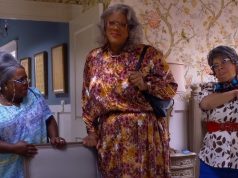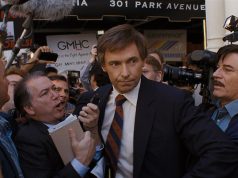“Hyde Park on Hudson” uses real events from the summer of 1939 to tell what is essentially two stories. One is about President Franklin D. Roosevelt’s intimate relationship with Daisy Suckley, a distant cousin who lives near his vacation home in Hyde Park, N.Y. The other is about a visit to Hyde Park by the King and Queen of England, who hope to gain FDR’s support in the impending war, and who experience some American culture shock in the process. It’s a tale of extramarital affairs and international affairs, of horn-dogs and hot dogs.
Yet contrary to what you might expect, the potentially sordid FDR-and-Daisy half of the drama is feebly unrewarding, bordering on pointless, and bogged down by ponderous narration from Daisy’s diary (read by Laura Linney, who plays her). Meanwhile, the FDR-and-the-King half is endearing and charming, with wonderful performances by Bill Murray as the polio-stricken president and Samuel West as stammering King George VI, two powerful men who find common ground in their weaknesses. You could have omitted the Daisy Suckley angle altogether, as far as I’m concerned — and yet that’s the movie’s hook! It’s the whole reason the movie exists! The world is upside-down, I tell you.
Written by Richard Nelson and directed, with an eye toward tony respectability, by Roger Michell (“Notting Hill,” “Venus”), “Hyde Park on Hudson” is set at the lush country estate belonging to Roosevelt’s mother (Elizabeth Wilson) in the president’s hometown. FDR comes here as often as possible with his staff to escape the madness of Washington D.C., and would happily run the country from Hyde Park full-time if he could. The president’s wife, Eleanor (Olivia Williams, de-beautified with character-appropriate choppers), makes occasional appearances. Franklin and Eleanor are not, shall we say, very close.
By nature a friendly and social man, Franklin cycles through the many fourth and fifth cousins who reside in the Hyde Park area, having this distant relative or that one come spend the afternoon with him in his study to keep him company. It is by this process that he re-encounters Daisy, whose family had money before the Depression but is now destitute. Daisy is nervous and unsure at first — distant relative or not, this is the President of the United States — but soon becomes Franklin’s bosom pal. They take car rides in the country, the president driving a specially made vehicle that allows him to operate it without the use of his legs. Daisy becomes a fixture at the Roosevelt house, regarded by the staff as somewhere between a mistress (not that anyone speaks openly of it) and a personal assistant. FDR’s actual personal secretary, Missy (Elizabeth Marvel), is jealous that her Mr. Burns has a new Smithers.
Then comes news that the British are coming! No English monarch has ever visited the United States before. King George VI and his wife, Queen Elizabeth (Olivia Colman), are not here to reclaim the colonies, however, but to talk FDR out of the isolationist policy that’s been keeping America from getting involved in Europe’s mounting troubles. If this whole “World War II” thing that Hitler’s been planning comes to pass, Britain would sure like to have America on her side.
The film has fun with preparations for the royal visit, with FDR’s aged but formidable mother barking orders to the staff and insisting that her son not offer the King and Queen alcohol. Eleanor wonders if she’ll be allowed to call the Queen by her name rather than “Your Majesty.” A fancy dinner and casual picnic are scheduled. When they arrive, the King and Queen are gracious guests but entirely out of their element, staying in bedrooms adorned with quaint cartoons mocking the War of 1812 and wondering what exactly a “hot dog” is. Life with the U.S. president is about as high as society gets in America, but it’s nothing compared to the formality and pomp of Buckingham Palace.
The best sequence in the movie comes after dinner, when president and king retire to the study to have drinks and talk turkey. You’ll recall from “The King’s Speech” that this monarch struggles with a stammer, and that he was reluctant to take the throne when his brother abdicated. He is as unsure and self-conscious as a king can be, not to mention reserved and proper in the manner of his countrymen. FDR, on the other hand, tells jokes, pours drinks, and laughingly dismisses some of the First Lady’s plans as “crazy” (the King would never speak of Her Majesty that way!). He doesn’t hesitate to ask the King to push his wheelchair into the study so they can be alone, and it’s profound to see the King — who is here to seek a favor, after all — perform such a humble task without a hint of offense.
As he tries to explain his country’s position and seek FDR’s input, the King gets frustrated by his tripping tongue and finally erupts, “This g– damn stutter!” Roosevelt’s kindly response: “What stutter? This g– damn polio.” Both leaders have obvious, potentially humiliating disabilities. What Roosevelt has that the King lacks is confidence.
The scene is well-written, but it’s Murray and West’s performances that make it so sweetly effective, demonstrating that these leaders, whatever else they might be, are good, decent men. While it may sound like stunt casting to put Bill Murray in the role of Franklin D. Roosevelt, Murray clearly didn’t see it that way. Ridding himself of ironic detachment, he pours humanity and compassion into the part in a way that we’ve seldom seen before, even when he’s played non-comedic roles. Samuel West, a busy British actor mostly unfamiliar to U.S. audiences, plays the King with dignified yet down-to-earth honesty. I could watch Murray and West as Franklin and Bertie all day long.
Ugh, but then there’s that other thing. I should stress that the lack of resonance in Daisy’s story isn’t the fault of Laura Linney, a fine actress who does everything she can with what she’s given. The problem is that the movie insists on telling this side of the story in vague, flowery terms rather than specifics, tiptoeing around the notion of FDR having “mistresses,” yet refusing to commit to — or comment on — what that entails. Even when Daisy is telling the story, she doesn’t say whether she and Franklin were physically intimate, preferring to describe her feelings poetically.
Does Daisy feel like a spurned lover? What does she expect from her relationship with FDR? Heck, I’ll ask a more fundamental question: Who is she? Despite all the screen time devoted to her and her emotional turmoil, we never get a sense of her personality or character, of her hopes and dreams, of her life before (or after) Franklin. She’s defined only by her connection to Roosevelt — and that connection is vaguely defined, too. This is a movie about FDR, not Daisy, but the movie thinks otherwise, to its detriment.
C (1 hr., 35 min.; )
Reprinted from Movies.com.





